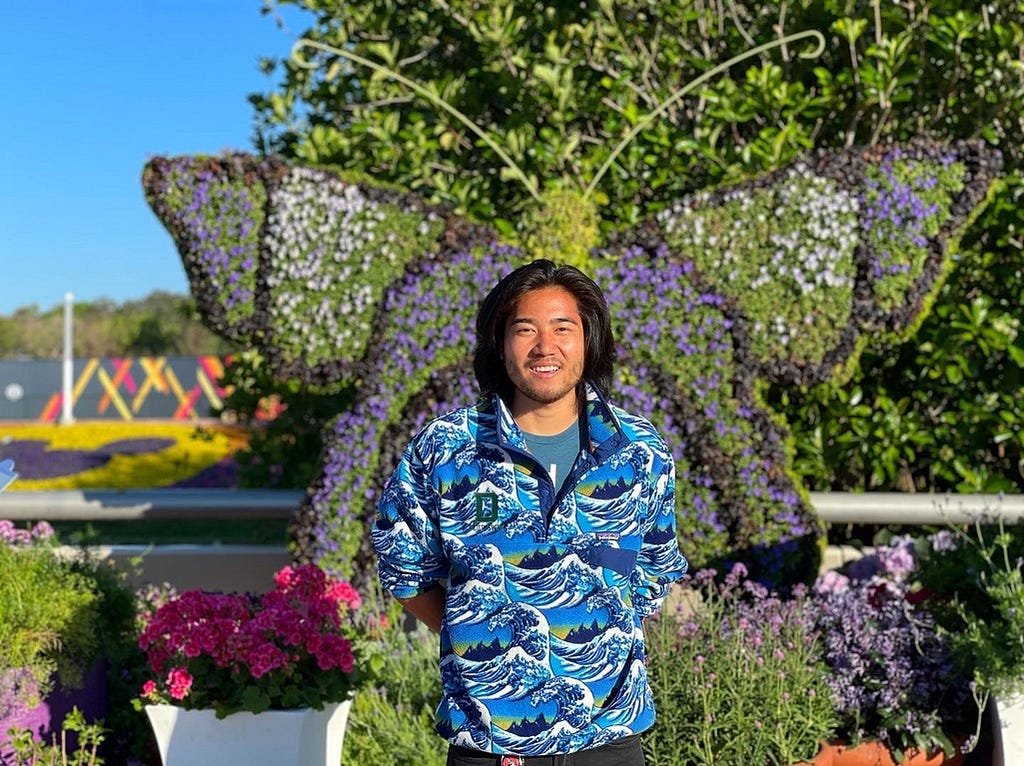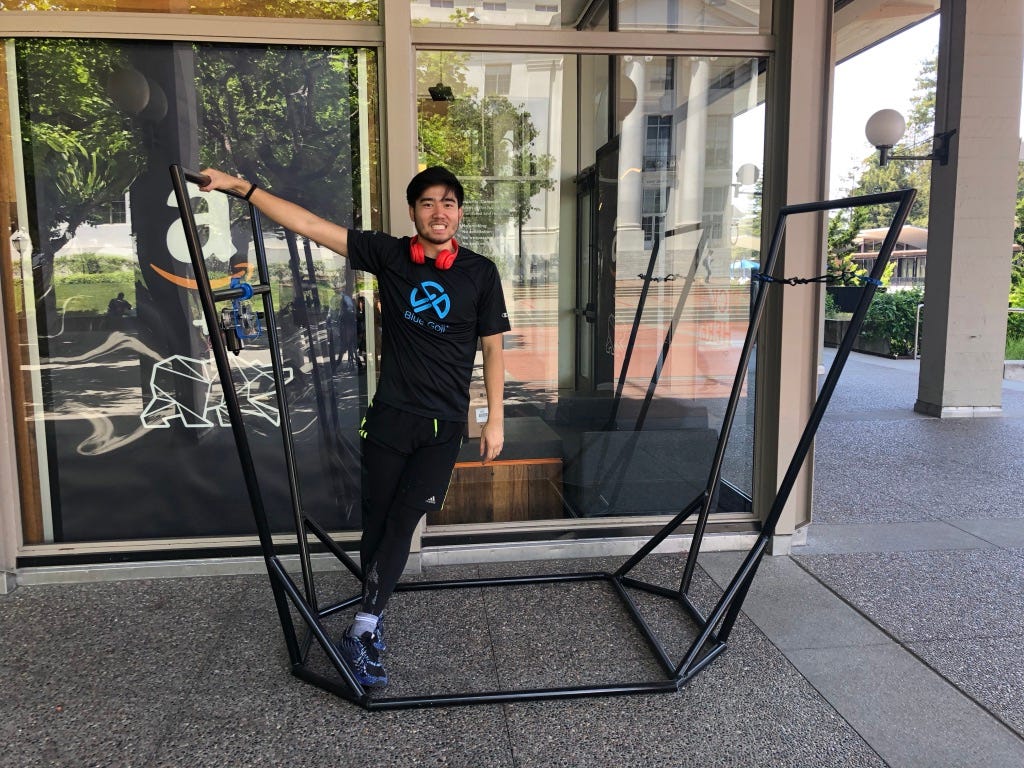On his experience as a 2019 graduate and how he discovered his enthusiasm for design.

Tell us about yourself.
I am an MEng alum, class of 2019, who concentrated in Mechanical Engineering/Product Design. I grew up in New Jersey and bounced around the east and west coasts, spending a high school semester at an art program at the Oxbow School in Napa. I spent most of my undergraduate career at Vassar College and concluded my final year at Dartmouth College. It did not take me long to pursue my master’s after earning my undergraduate degree. I took my version of a gap year by participating in the Disney College program. This fulfilled a childhood dream, having grown up making many trips to Walt Disney World in Florida. I then transitioned into a professional internship with Disney before heading west to UC Berkeley.“I always want to be improving as a person; I never want to stop moving or stagnate.”
What do you study and why did you choose it?
I went into undergrad committed to a very concrete plan. I was going to be pre-med and major in Math to set myself apart from the typical medical school applicant. Things obviously changed for me along the way. As math courses got more theoretical and into the world of proofs, I found I was not as interested in those less real-world uses and transitioned to physics. I spent a year abroad at Dartmouth College trying engineering, as Vassar did not have an engineering program, and I loved it as it moved me even further into practical applications. Looking back, mechanical engineering, and more specifically product design, should have been an obvious choice for me. Throughout my life, I have loved both my creative and technical classwork. I spent most of my free time in high school hand-building sculptures in the ceramics studio. I was always torn between the two ends of the spectrum thinking I would have to choose. Product design sits as a great intersection between those worlds and allows me to use my problem-solving and visual arts skills simultaneously.What has your degree done for you professionally?
I really buy into the leadership aspect of the MEng program. I want to shape the future with both my own work and the impact I have on others. I am lucky enough to have had many wonderful people invest in me and my growth, and I want to give back to them by paying it forward. While I’m probably still in my mentee stage at this point in my early career, I look forward to being a mentor and talent developer down the road. I feel like I’ve gotten a taste of my role as an MEng program admissions interviewer and program ambassador talking to prospective students. I cannot wait to do more!What led you to apply and join the Berkeley MEng program?
My interest in the MEng program was a combination of the duration and diverse curriculum. I applied to graduate programs while I was doing my internship with Disney, which I loved. I was itching to get my master’s done quickly to get back to the professional world. Thinking that I would eventually go on to get an MBA and given my interest in the creative design side of things, I looked at a variety of programs emphasizing design and/or business and leadership in addition to the core engineering courses. As a short multidisciplinary program, the MEng fit what I was looking for perfectly, and being in the Bay Area definitely did not hurt.What did you take away from the MEng program?
Obviously, I picked up a lot of new skills in leadership, teamwork, and hands-on making. Between my product design coursework (all project-based classes) and capstone project, I practiced a wide range of fabrication and prototyping techniques. In the second semester of the program, I was taught to weld my first butt joint and ended up welding together a large steel tube frame as an integral part of my capstone. With so many projects, I was exposed to diverse teams and negotiated different dynamics. Most importantly, I came away with relationships with members of my cohort. I learned so much from interacting with other students from different backgrounds and from different parts of the world.“I looked at a variety of programs emphasizing design and/or business and leadership in addition to the core engineering courses… the MEng fit was what I was looking for perfectly.”

What kind of impact do you want to have on the world?
I like making people happy! I think my life’s purpose is to create joy, which helps ground my professional work. Some of my favorite experiences were the summers I spent between my college years as a camp counselor. I loved creating fun experiences for campers because I could directly see the results of the effort I was putting in. As engineers, we are so often disconnected from our end-user or customer. We focus on the problem itself as an isolated thing, with no outside influence. It becomes easy to forget that what you do makes a difference in people’s lives. Thinking of the potential impact of your work product, the “why” we do what we do, is a really awesome motivating tool and something you should never forget.What are some of your non-academic hobbies/passions, and how, if at all, have they inspired your professional goals?
I was a swimmer for most of my life. Though I consider myself retired from aquatic life, I still have that competitive spirit that I now channel into running and pickleball. For me, athletics keeps me motivated and committed to getting better. I can concretely measure improvement in my race times or my pickleball scores. To me, that is a luxury you do not get in the professional world. It is impossible to get a true and non-subjective assessment of your job performance and you’re not often getting regular feedback on your work. I always want to be improving as a person; I never want to stop moving or stagnate. Having something in my life where I can see tangible progress on a regular basis keeps me pushing and striving for the best.“It becomes easy to forget that what you do makes a difference in people’s lives.”
What advice do you have to share with future MEng students?
Don’t be afraid to study or pursue something that does not seem relevant to your chosen field. The world is a crazy, interconnected place. You never know when something random might be helpful or what doors it could open. My path to engineering was obviously not linear, and the skills I have from my non-engineering experiences give me a unique perspective and approach. While you definitely need a strong core skillset, what makes you stand out are your peripheral skills and interests. Different is good! Connect with Patrick Lai. Edited by Nick Yang.Patrick Lai, MEng ’19 (ME): “Product design is at the intersection of art and engineering.” was originally published in Berkeley Master of Engineering on Medium, where people are continuing the conversation by highlighting and responding to this story.




